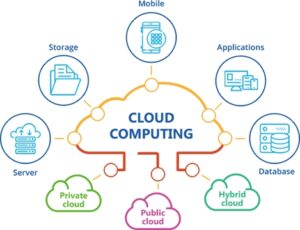The ongoing digital transformation is making left a massive impact on personal lives, it has affected professional lives particularly the healthcare industry, too. And, one of the most essential and beneficial practices that have been introduced lately is CLOUD COMPUTING in the health sector.
It is no surprise; healthcare is a place where a tremendous amount of sensitive information is kept including patients’ medicinal and financial details. And, yes, the research, as well. For easy access and lessening the workload, preserving a quick and protected database is really the greatest task.
COVID and Cloud Computing Demands

With the outbreak of the COVID-19 pandemic, the working and daily operations held in healthcare facilities have been affected greatly.
The huge volume of healthcare professionals that are shifted to “work from home OR remote work” are attending conferences and doing collaboration online which is stressing back-end network support services beyond imagination. The increased need for remote work has greatly emphasized the need for infusing the use of public cloud infrastructure.
Undoubtedly, cloud computing in the health sector seems like a flexible solution letting the medical facilities control remotely accessible systems keeping the massive data secure. Besides, the increased cases of COVID-19 demand an excessive amount of data to be stored, secured and shared.
But due to heavy load, the slow speed sharing and updating of the data has put a lot of burden on healthcare specialists. With the use of the cloud, a broad range of virtues can be enjoyed by the professionals including elastic and virtually limitless scalability, maximum availability and all-time accessibility to data, and the looked-for IT financial shift from capital to effective disbursements.
In these difficult times of pandemic, the facilities using robust IT structure based on cloud computing have been able to provide a satisfactory customer experience while managing the up-surge load of data and patients hassle-free. Cloud computing in the health sector could offer a fast, safe, and profitable solution for data storage and backup.
Cloud-based Infrastructure Helping to Discover a Vaccine for Coronavirus
You would not believe how amazing the cloud-based infrastructures helped and still helping medical researchers and healthcare experts all around the globe to create a successful vaccine against coronavirus. Cloud-used platforms have made collaboration easier letting all the professionals work together. It is found to have a major role in testing medicines and conceivable antibodies for COVID-19. For example,
IBM Corporation has brilliantly supported the healthcare sector by expanding the availability and easy accessibility to cloud-based AI research assets
Oracle has made a great contribution in making coronavirus antibody by creating a speedy and effective cloud infrastructure for scientific groundworks and clinical trials
Cloud Data Service Companies that Support Healthcare
- NetApp – A Hybrid cloud data services company
- Medsphere – A healthcare IT services company
- ClearData – A cloud computing HIPAA compliant
- Nintex – For providing automation services to healthcare experts
- Medable – A medical-grade platform
- Carecloud – A leading healthcare technology company
Benefits of Cloud Computing in the Healthcare Sector During a Pandemic

Collaboration
Due to the increased preference for value-based care payment approaches, sufficient and speedy coordination is required between institutions and experts. A dependable cloud platform can help you centralize all of the stored data allowing easy and quick access anywhere, anytime.
Management of Servers
One of the most underrated advantages of cloud computing in the health sector is management. Having a cloud infrastructure that is watched and managed by skilled IT professionals is a big plus. How? Because then healthcare providers will get more time to be able to pay attention to important healthcare services and discoveries instead of managing data that is not their domain.
Scalability
The best feature about cloud computing in healthcare uses is its ability to be upgraded or downgraded depending on the use or need of the time. Offering the flexibility of managing data storage, you can better manage the patient inflow.
All you will be paying is for what you use. During COVID-19, the features are upscaled making more space for storage and enhancing speed.
Data Storage
Keeping medical information as electronic records seems like a better, secure, and easy option. Cloud computing in the health sector not only offers assistance in securing data but also in managing patient portals, and looking into mobile apps along with saving you from spending additional expenses of handling physical servers.
Fast Speed
The COVID-19 has accelerated the patient numbers and managing such a massive collection of data requires speed. Faster availability to cloud servers helps in quick data uploading and sharing. And, yes, the recovery, too.
Fast-speed cloud computing structures are a lot more time-efficient. Faster the speed, easier and quicker the exchange of data and communication!
Access to New Telehealth Capabilities
In the modern era, multiple healthcare experts have turned to telehealth. It helps them connect with patients more efficiently and from remote areas. And, we all know how important social distancing is in this pandemic. It also benefits the patient as they could effortlessly access telehealth services by scheduling as well as paying for a visit.

Patient Security and Care with Backup
Chief cloud computing organizations including Microsoft, Amazon, and Google have been trying to certify that all data centers are HIPAA compliant for offering safer storage and enhanced security. Having physical data centers are prone to challenges but cloud computing can help securely manage data.
If anything happens, then remote cloud placements can be backed up. Besides, you can upscale them frequently to keep the data safe from malware attacks or hijacking.





